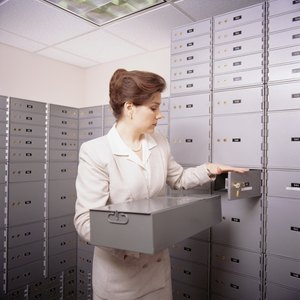
A savings account is a safe place to store money, but cash isn't the only valuable that you stash at a bank. Banks also offer safe deposit boxes, which are physical containers stored inside vaults that customers can use to protect items such as important documents and jewelry. Safe deposit boxes offer several benefits that give them some notable advantages over trying to protect valuables in your own personal safe or hiding spot.
Security
Safe deposit boxes are stored in the most secure areas of banks, which makes it extremely unlikely for a box to be stolen. According to the Federal Deposit Insurance Corporation, boxes are stored in concrete or steel vaults equipped with sophisticated alarms, locks, video cameras, motion sensors, heat detectors and other security devices. Accessing a box requires following strict identification procedures, and in some cases, opening it requires two keys. Consumer safes are easier to break into than bank vaults, and a robber could potentially steal your entire safe and break it open later or force you to open it.
Disaster Protection
Home disasters such as fires, storms and floods can cause major damage to homes and any valuables you have inside. Even if you put your valuables in a safe, it might not protect the contents from flood waters or prolonged exposure to flames. According to the FDIC, banks place safe deposit boxes in vaults that are highly resistant to fire, flood, heat, earthquakes, hurricanes, explosions and other disastrous conditions.
Handling Your Estate
When you pass away, the valuables you leave behind become a pool of property called an estate that is doled out to your heirs. Your estate is handled by a person called an executor that you appoint in your will. After death, your executor gains the legal right to access your safe deposit box. Keeping important documents and other valuables in one place can make things easier on the executor to carry out your wishes.
Considerations
A safe deposit box is generally a good place to store important documents and valuables that you don't plan to access on a regular basis. According to the FDIC, a safe deposit box is a smart place to put the originals insurance policies, family records, deeds, titles, contracts, stocks, bonds, jewels, medals, rare collectibles and irreplaceable photographs. On the other hand, it is usually not a good idea to put anything you might need in an emergency in a safe deposit box, since you might not be able to access your box immediately. In addition, it is a bad idea to put cash in a safe deposit box, since you can put cash in a government-insured savings account that earns interest.
References
- Federal Deposit Insurance Corporation: FDIC Consumer News - Spring 1997
- Mint.com: What You Should (and Shouldn’t) Put in a Safe Deposit Box
- Bankrate: What Not To Store In Your Safe-Deposit Box
- Federal Deposit Insurance Corporation. “Five Things to Know About Safe Deposit Boxes, Home Safes and Your Valuables.” Accessed May 8, 2020.
- ESL Federal Credit Union. "Safe Deposit Boxes: Fees." Accessed May 8, 2020.
- Wells Fargo. “Order Checks, Stop Payments, and Other Requests Questions.” Accessed May 8, 2020.
- National Personnel Records Center. "DD Form 214, Discharge Papers and Separation Documents." Accessed May 8, 2020.
- TreasuryDirect. "Series EE Savings Bonds." Accessed May 8, 2020.
- Federal Deposit Insurance Corporation. “A Guide to What Is and Is Not Protected by FDIC Insurance.” Accessed May 8, 2020.
- Arkansas Law Review. “The Legal History of Safekeeping and Safe Deposit Activities in the United States,” Page 728. Accessed May 8, 2020.
- New York Times. "What You Need to Know About Safe Deposit Boxes." Accessed May 8, 2020.
- BBVA. "Bank Safe Deposit Box." Accessed May 8, 2020.
Writer Bio
Gregory Hamel has been a writer since September 2008 and has also authored three novels. He has a Bachelor of Arts in economics from St. Olaf College. Hamel maintains a blog focused on massive open online courses and computer programming.

